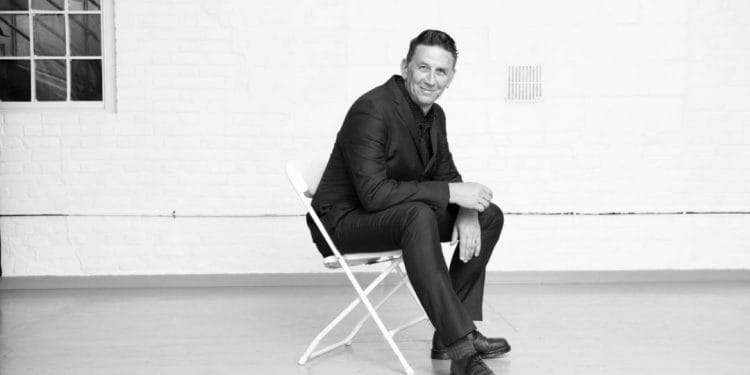Award winning poet Martin Figura follows his previous auto-biographical, Ted Hughes Award nominated show Whistle with a look at love and life through a mathematical lens. Whilst Whistle explored his childhood, Doctor Zeeman’s Catastrophe Machine looks at the life he made after. In this new standalone show, Martin tells the story of his adulthood, using sound, images, poetry and a mathematical machine.
Find out more about Doctor Zeeman’s Catastrophe Machine here.
Tell us in your own words a little about your current show, Doctor Zeeman’s Catastrophe Machine?
It’s a reckoning and picks up where Whistle the show about my childhood, left off. It looks at my life’s small, and not so small, catastrophes and how in the long run they have worked out for the best. Behind this it looks at memory, the way it shifts and how we shape it into a story that we can present to ourselves and the world. It is sad and funny, sometimes at the same time. I am accompanied on stage by a pseudo Catastrophe Machine, built by Paul Finlay from an old bike frame, a salvaged washing machine engine, and car windscreen wiper motors – it makes a great noise. As with Whistle the show draws on photography and has visuals put together with Andre Barreau, support by myself and Karen Hall. Andre has also put together the soundscape that runs through the show.
I go ‘On The Road’ across California in a mid-life crisis sports car with a perpetually hungry teenage son. I’ll open my box of family photographs and explore the way memory shifts with the help of Roland Barthes. My Down’s Syndrome daughter Amy shows us all how to live. After nearly fifty years a drop of milk finally falls perfectly into the fifth of seven oceans. In Paris I climb aboard the big wheel, utterly in love.
Sometimes catastrophe is for the best, you don’t know that then of course and may even try to crawl back over broken ground to where you were before. I’m in my sixties now, driving steadily towards the final, inevitable catastrophe. In spite of it all find myself looking in the rear-view mirror and smiling. When I look ahead, it may be raining and a bit blurry (I’m accidentally wearing my reading glasses) but I see no reason at all to take my foot of the accelerator. To keep the wheel spinning.
The show has a number of UK tour dates, why is it important to you to perform your work live to a wide range of audiences?
First and foremost I am a show-off and love performing. It is the most exciting part of the creative process for me. There is nothing quite like direct engagement with an audience, it gets the work out there and tests it. The demography and boundaries of spoken word are broadening and I’m excited about the theatrical possibilities being explored by artists such as Luke Wright, Ross Sutherland and Jemima Foxtrot amongst others. It is a really interesting time for Spoken Word, with enormous untapped potential.
Your life has certainly been varied, with full blown careers in the army, accounting and photography, can you imagine changing tack again or is poetry the career you were always destined for?
I think this is it now, I thought perhaps I’d have the time for more photography but I don’t and I miss it. Poetry and spoken word is where my head is at, and I feel I’m only just getting into my stride.
Your work has often had a biographical aspect, why do you think that is?
I have in many ways had an extraordinary life, which I’ve somehow come through and ended up ridiculously happy. Writing is the best of way of making sense of that and coming to an understanding. Fortunately it does seem to interest people. I have of course have been engaged in accountancy for a good part of it – I’m saving this element of my life for the musical.
Your wife, Helen Ivory, is also a poet – what are the pros and cons of living and working with someone in the same field?
Only pros as far as I’m concerned. Helen is not only a very accomplished writer, but also a first class teacher and editor. She sits right behind me as I write – literally and metaphorically. She has been essential to my development as a writer, we discuss our work with each other every day. We have no trouble spending every day together, in fact we’re pretty rubbish at being apart and keep it to a minimum.
Your daughter is a cornerstone of the show, has she been to see it yet?
Amy has seen the pictures and ‘co-operated’ in some reconstructions for the benefit of the show, but she would never sit through an hour of me talking without interrupting or even demanding that I shut up and take her bowling. There are many wonderful things about her, but being a quiet audience member isn’t one of them, especially when there are pictures of her on a big screen to shout about. She is not prepared to be reasonable about this.
What distinguishes spoken word or performed poetry from a (one man) theatre show?
Not much really, other than it contains some poetry – which some people are allergic to. It also tends not to be ‘acted’ – that is me up there, being me.
How would you describe Doctor Zeeman’s Catastrophe Machine in three words?
Not very well. or, if you prefer – A happy ending













